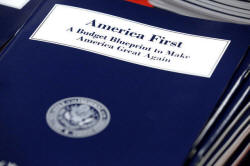|
Congress moves closer to
deal to avert government shutdown
 Send a link to a friend
Send a link to a friend
 [April 26, 2017]
By Eric Beech and Susan Cornwell [April 26, 2017]
By Eric Beech and Susan Cornwell
WASHINGTON
(Reuters) - The U.S. Congress was moving closer to crafting a deal to
avoid shutting down at the stroke of midnight on Friday, but the details
and even broad strokes of an agreement were still murky.
Some lawmakers are optimistic they can hammer out a budget bill to take
the government to the end of the current fiscal year on Sept. 30, while
others see Congress putting a short-term spending resolution in place
for a week, while talks continue.
Either way, the pressure is mounting to come up with a plan before
Friday night. If lawmakers do not have one, funding for many federal
agencies will abruptly stop and millions of government workers will be
temporarily laid off.
Many policy makers are nervous about a repeat of 2013, when the
government was shuttered for 17 days.
On Monday President Donald Trump eased up on demands to include funding
for a southern border wall in any budget pact, clearing a major obstacle
in the negotiations.
White House Budget Director Mick Mulvaney told CNN late on Tuesday that
the Trump administration had also informed Democrats on Monday it would
move discussions on building a border wall to September, when the
government must negotiate the budget for its next fiscal year.
"And we thought that was going to get a deal done and we’ve not heard
anything from them today," he said. "So I’m not sure what’s happening."

Even though Trump's fellow Republicans control both chambers of
Congress, they only have 52 seats in the Senate. To amass the 60 votes
needed there to pass the budget, Republicans will have to bring
Democratic lawmakers onto their side.
The most powerful Democrat in the Senate, Chuck Schumer, said on Tuesday
his party is concerned about the ratio of increase in defense and
non-defense spending. Democrats prefer a one-to-one ratio, and boosting
both sides of the budget equally could become a sticking point in
negotiations.
Democrats also want provisions for more healthcare coverage for coal
miners and appropriations for healthcare subsidies. Health insurance
would abruptly become unaffordable for 6 million Americans who rely on
cost-sharing subsidies under the national health plan commonly called
Obamacare.
[to top of second column] |

U.S. President Donald Trump's overview of the budget priorities for
Fiscal Year 2018 are displayed at the U.S. Government Publishing
Office (GPO) on its release by the Office of Management and Budget
(OMB) in Washington, U.S. on March 16, 2017. REUTERS/Joshua
Roberts/File Photo

Democrats have been seeking immediate assistance for a funding gap in Puerto
Rico's Medicaid program, federal health insurance for the poor, saying it is in
such bad shape that 1 million people are set to lose healthcare.
Mulvaney also said Trump would not agree to including Obamacare subsidies in a
spending bill.
He told CNN that Democrats "raised Puerto Rico for the first time a couple of
days ago," but did not give Trump's stance on the Medicaid assistance.
Outside political pressure groups are watching for which "riders" may be added
to any deal that emerges this week.
Spending resolutions primarily lay out how government money can flow, but often
also include riders, smaller measures attached to the budget so they can become
law.
Past riders have touched on areas such as banning the Securities and Exchange
Commission from requiring corporations to disclose political donations.
Democrats said they were worried Republicans could try to attach language
limiting family-planning funds, and Schumer expressed concerns about attempts to
undo Wall Street reforms enacted after the 2007-09 financial crisis.
(Additional reporting by Richard Cowan and Lisa Lambert; Writing by Lisa
Lambert; Editing by Clarence Fernandez)
[© 2017 Thomson Reuters. All rights
reserved.] Copyright 2017 Reuters. All rights reserved. This material may not be published,
broadcast, rewritten or redistributed.
 |